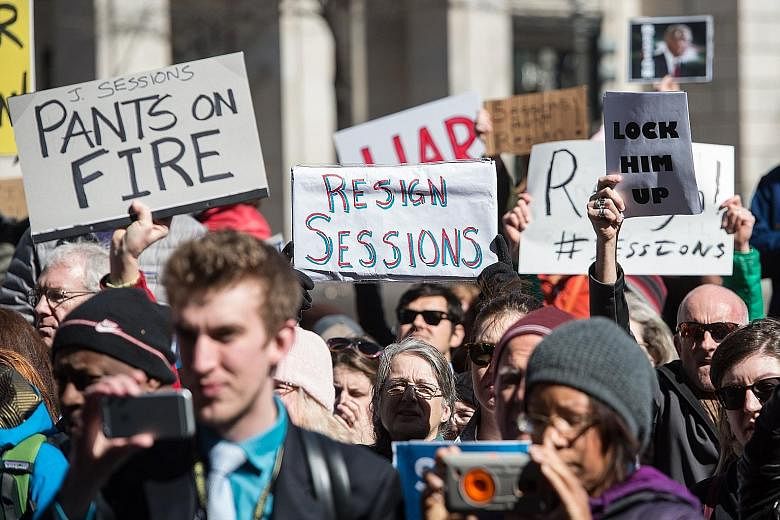WASHINGTON • The recusal by United States Attorney-General Jeff Sessions from any investigations related to the Trump campaign seemed to do little to quell the rancorous partisan debate over Russian meddling in the presidential election, The Washington Post reported yesterday.
Republicans were trying to put the controversy to rest while Democrats pushed for Mr Sessions to answer more questions under oath and take more steps to ensure the independence of probes that might implicate other associates of the President.
Mr Sessions had denied he had contact with Russian officials when he was asked directly during his Senate confirmation hearing to become attorney-general whether he had exchanged information with Russian operatives during the election campaign.
Last Thursday, he said he did meet Russian Ambassador Sergey Kislyak in his Senate office two months before the election, and at an event with other ambassadors at the Republican National Convention, Reuters reported.
-
Legal issues surface after recusal
-
The decision by US Attorney- General Jeff Sessions to recuse himself from any investigations relating to the Trump campaign's links to Russia has heightened interest in several related legal issues.
Here is a look at some.
Q What does it mean for the A-G to recuse himself?
A Generally, United States attorneys-general directly oversee criminal investigations.
In a case that raises politically sensitive issues, the attorney-general would normally be briefed on proposed major decisions - like whether to subpoena a high-profile witness or bring charges - and could overrule them.
By recusing himself now, Mr Sessions is responding to concerns that exercising that role, in light of his ties to the Trump campaign, would call into question the impartiality of the justice system.
Q Who replaces the A-G after a recusal?
A The deputy attorney-general steps into the shoes. The acting deputy attorney-general is Mr Dana J. Boente, the US attorney for the Eastern District of Virginia, whom President Donald Trump temporarily elevated last month after firing Ms Sally Q. Yates, who had been the deputy attorney-general.
Q Did Mr Sessions commit a crime?
A In a letter to the Federal Bureau of Investigation and Justice Department, Democrats on the House Judiciary Committee had asked for "an immediate criminal investigation into these statements, which could potentially implicate a number of criminal laws, including lying to Congress and perjury".
But it is unlikely the Justice Department will bring charges against the attorney-general. It is not enough to say something that turns out to be false. The speaker must have intentionally lied.
Mr Sessions has said that while some people think he made a false statement, it was "not my intent".
His answer was "honest and truthful as I understood it at the time" because the context of the question was an allegation that the Trump campaign and Russian government were exchanging information.
He said he understood his meetings with the Russian ambassador to be linked to his role as a senator, and not his role as a campaign surrogate.
NYTIMES
Meanwhile, a report in the Wall Street Journal (WSJ) on Friday said Mr Sessions paid for his travel expenses to the Republican convention - where he met the Russian ambassador - using his own campaign account, and not official funds that would pay for travel by him or other members of the Senate Armed Services Committee.
WSJ cited campaign finance disclosure records showing Mr Sessions paid for hotel rooms using the campaign account.
Mr Larry Noble, general counsel at the Campaign Legal Centre, a non-partisan advocacy group, was quoted as saying Mr Sessions likely used his campaign account and not Senate funds, as it would have been difficult to argue that he was not attending the convention for any political purpose.
President Donald Trump on Friday jumped more fully into the back-and-forth, taking a swipe at Democrats, who themselves had met Russian officials, and calling, perhaps facetiously, for them to be investigated.
He and his aides unearthed a more-than-decade-old photo of Senate Democratic leader Charles Schumer indulging in a doughnut and a cup of coffee with Russian President Vladimir Putin during a visit to New York City. "We should start an immediate investigation into @SenSchumer and his ties to Russia and Putin," Mr Trump posted on Twitter. "A total hypocrite!"
The President followed his first message with another tweet calling for a second investigation into the ties of House Democratic leader Nancy Pelosi to Russia, The Washington Post said.
The missive cited a news story about her 2010 meeting with Mr Kislyak, which she did not acknowledge when asked whether she had ever met the ambassador.
Meanwhile, Senator Dianne Feinstein, ranking Democrat on the Senate Judiciary Committee, requested that the Justice Department's inspector-general investigate Mr Sessions' decision to recuse himself in a broad probe that would also assess his involvement before he stepped aside, The Washington Post said.
The back-and-forth came a day after Mr Sessions declared at a hastily called news conference that he would recuse himself from any investigations related to the Trump campaign, for which he served as a key adviser. His news conference was scheduled less than 24 hours after The Washington Post reported that he had twice met Mr Kislyak during the presidential campaign.
The revelation that Mr Sessions had met Mr Kislyak sparked a political firestorm.
Defending himself on Fox News, Mr Sessions said his response was specific to a particular question from Senator Al Franken.

